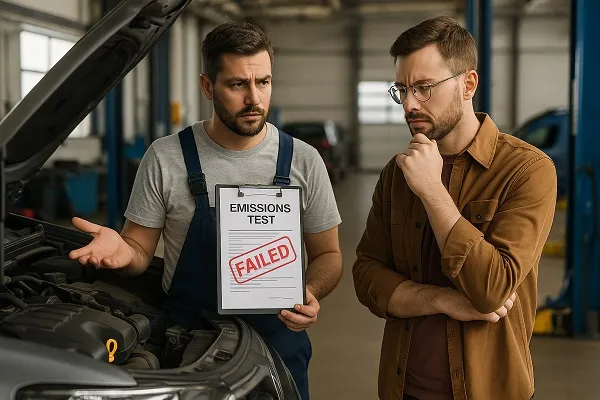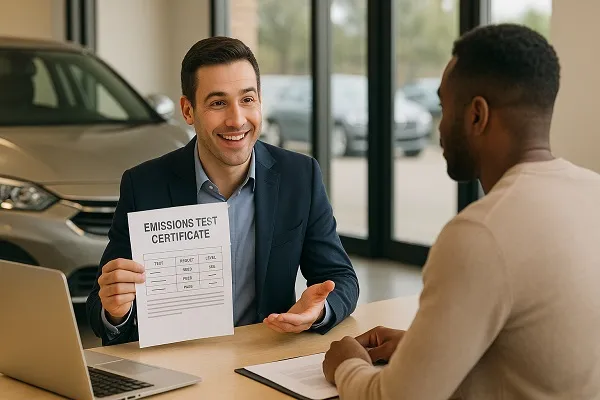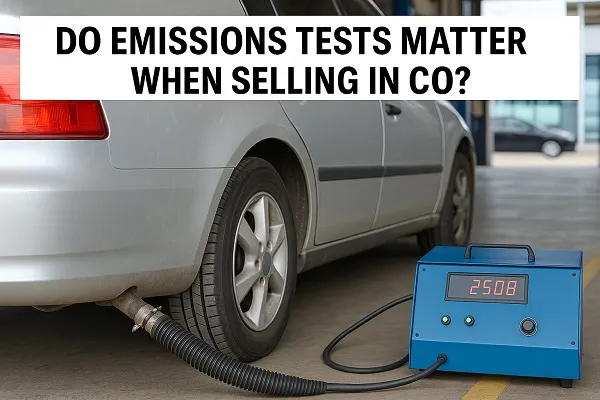Do emissions tests matter when selling in Colorado? Absolutely. If you’re planning to sell your vehicle in the state, understanding how emissions testing requirements affect the process can save you time, money, and potential legal trouble. Emissions compliance is more than a formality in Colorado. It’s a legal requirement in certain areas designed to keep the air clean and vehicles operating efficiently.
This guide explains why emissions testing is important when selling a car in Colorado, what’s required, and how to handle common issues sellers face.
Understanding Emissions Requirements When Selling a Car
When selling a vehicle in Colorado, emissions testing often becomes part of the transaction, especially if you live in or near the Denver or Boulder metro areas. The Colorado Department of Public Health and Environment enforces strict air quality standards to control pollutants.
- Buyer Confidence: Providing proof of a passed emissions test reassures buyers that the car is road-ready and compliant.
- Legal Compliance: In certain counties, the seller must provide a valid emissions certificate before completing the sale.
- Avoiding Delays: Without a valid test, the sale can stall or even be canceled if the buyer can’t register the vehicle.
If your vehicle fails the emissions test, repairs may be required before you can finalize the sale.
Where Emissions Testing Is Required in Colorado
Not all regions in Colorado require emissions testing. Knowing where you stand helps determine if you need to schedule a test before selling.
Counties Requiring Emissions Tests
- Denver
- Boulder
- Jefferson
- Adams
- Arapahoe
- Douglas
- Broomfield
- Portions of Larimer, Weld, and El Paso counties
Vehicles registered in these areas must typically pass testing every two years. When selling, the most recent certificate must be valid at the time of sale.
Who Is Responsible for the Emissions Test

In Colorado, the responsibility for obtaining an emissions test before a sale depends on who is selling the vehicle and where it’s located.
Private Sales
The seller is responsible for providing proof of a current passing emissions test unless both parties agree in writing that the buyer will handle it.
Dealership Sales
Dealerships are legally required to ensure every vehicle they sell in an emissions-controlled area passes the test before the sale is finalized.
Out-of-State or Rural Sales
If the vehicle is sold from a county without emissions testing requirements, it typically doesn’t need a test before sale. Unless it’s being registered in an area that does require one.
How Long an Emissions Test Is Valid
An emissions test certificate in Colorado is valid for 12 months from the date of testing. This means if you’re selling your vehicle within that window, you can use the same certificate for the sale.
If more than a year has passed, you’ll need to complete a new test before transferring ownership. Buyers often verify this detail before completing the purchase, especially in emissions-controlled counties.
What Happens If Your Vehicle Fails

Failing an emissions test doesn’t necessarily mean your vehicle can’t be sold, but it does complicate things.
- Repair Requirements: The seller may need to complete necessary repairs before retesting.
- Waivers: In some cases, a waiver may be available if repair costs exceed a set limit, but the vehicle must still meet minimum emission standards.
- Buyer Agreement: You can sell a failing vehicle if the buyer agrees to take responsibility for repairs, but this must be clearly stated in writing.
Addressing emissions issues upfront helps avoid disputes or registration problems after the sale.
Selling Without a Current Emissions Test
Selling without a valid emissions certificate in an area where one is required can lead to significant challenges.
- The buyer won’t be able to register the vehicle until it passes testing.
- The sale might violate state regulations, especially if you advertise the car as ready for registration.
- Buyers may request a price reduction to offset the potential repair costs.
While it’s possible to sell without a test in specific cases, doing so can reduce your pool of interested buyers and extend the selling process.
Common Misunderstandings About Emissions Testing
Many vehicle owners in Colorado misunderstand the emissions requirements when selling. Clarifying these points helps ensure compliance.
Common Myths vs. Facts
- Myth: Only older vehicles need testing.
- Fact: Most gasoline vehicles older than seven years require testing every two years.
- Myth: New owners don’t need to retest if the seller already did.
- Fact: A valid certificate can be transferred, but it must still be within the 12-month window.
- Myth: Electric or hybrid cars always need testing.
- Fact: Fully electric vehicles are exempt; hybrids often require testing depending on model year and region.
Benefits of Providing a Valid Emissions Certificate

For sellers, offering a current emissions certificate isn’t just about compliance, it’s also a selling advantage.
- Builds trust and transparency with buyers
- Demonstrates vehicle reliability and proper maintenance
- Reduces registration delays for the buyer
- Helps your listing stand out among vehicles without certification
A vehicle that has already passed emissions testing is more appealing to potential buyers, particularly in competitive markets like Denver or Boulder.
Preparing Your Vehicle for Emissions Testing
Ensuring your car passes the emissions test the first time saves stress and expense. A little preparation can go a long way.
Simple Preparation Tips
- Get a pre-test inspection from a trusted mechanic
- Ensure your check engine light is off
- Drive the vehicle for at least 15 minutes before testing to warm the engine
- Replace air filters or spark plugs if overdue
- Use the recommended grade of fuel
Taking these steps can increase your chances of passing and make the sale process smoother.
Selling a vehicle in Colorado means paying attention to more than just the asking price and condition, the emissions test plays a vital role. Whether you’re selling privately or through a dealership, having a valid emissions certificate gives buyers peace of mind and ensures compliance with state laws. It can also boost your credibility as a seller and make your transaction faster and easier.
If you’re preparing to sell your car in CO, schedule the emissions test early, keep your certificate handy, and communicate openly with potential buyers about your vehicle’s compliance status. Doing so will not only streamline the process but also help maintain Colorado’s air quality standards while protecting your interests.
Content reviewed and published by Sell My Car Colorado Editorial Team.
